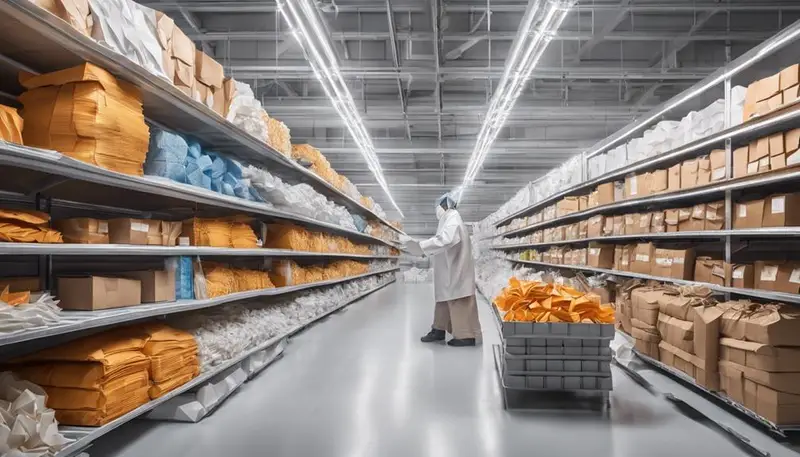The debate surrounding the advantages and drawbacks of working in freezer environments is multifaceted. It encompasses aspects from job security and specialized skill requirements to the physical and psychological challenges posed by extreme cold conditions.
While the allure of competitive compensation and the camaraderie fostered among teams in such settings cannot be understated, the potential health implications and the necessity for rigorous safety protocols present a complex scenario for prospective employees.
Further examination into how individuals navigate these challenges, and the strategies employed by organizations to mitigate adverse effects, offers an intriguing perspective on this unique work setting.
Key Takeaways
- Freezer work offers competitive wages and job stability due to specialized skill requirements.
- Workers face health risks like frostbite and hypothermia, necessitating strict safety protocols.
- Career advancement within freezer environments is limited, with few opportunities for skill diversification.
- Protective clothing and equipment are essential for maintaining worker well-being in cold temperatures.
Job Security
Working in a freezer environment offers significant job security, attributed to the specialized skills and extensive experience required for these positions. Individuals who pursue careers in this sector find themselves in a niche market that not only values but necessitates their unique expertise. This demand for specialized knowledge and the years of experience needed to navigate the complexities of freezer work result in unparalleled job stability. Employees can look forward to long-term career prospects with minimal fear of losing their positions, a rarity in many industries today.
Moreover, the job benefits associated with freezer work, including high wages and bonuses, serve as a strong incentive, attracting job seekers to the industry. These financial rewards reflect the value placed on the skills and dedication required to perform in such challenging conditions. The workplace culture further reinforces this stability by emphasizing teamwork and coordination, crucial elements for ensuring efficient operations within the freezer environment. This combination of factors contributes to a sense of job security that is both desirable and attainable for those willing to meet the demands of working in a freezer.
Specialized Skills

Mastering specialized skills is pivotal for individuals aiming to excel in the demanding environment of freezer work. The unique challenges posed by such settings necessitate a comprehensive understanding of equipment maintenance requirements. Ensuring the proper functioning of freezers not only facilitates the smooth execution of tasks but also significantly contributes to the overall success of operations within this cold environment.
Moreover, the adoption of proper safety precautions cannot be overstressed. Workers must be adept at recognizing and mitigating health risks associated with extreme cold temperatures to maintain a safe working environment. This involves a blend of knowledge and practical application, emphasizing the importance of specialized training.
Effective teamwork and communication are the bedrocks of productivity in freezer settings. The ability to work cohesively with others, sharing insights and coordinating efforts, is essential for timely and efficient task completion. This collaborative spirit is underpinned by each member's technical knowledge and expertise, highlighting the value of specialized skills in this context.
Developing these skills not only ensures personal and team safety but also enhances operational efficiency. The commitment to learning and applying these specialized skills is what differentiates successful freezer work professionals, making them indispensable in their roles.
Physical Discomforts

While specialized skills are critical for success in the cold environment of freezer work, it is equally important to acknowledge the physical discomforts that workers may face due to extreme temperatures. Extreme cold can significantly impact the well-being of individuals working in freezer environments, leading to conditions such as frostbite and hypothermia if proper precautions are not taken. The cold not only poses a risk to the skin and extremities but also affects workers' operational capabilities. Prolonged exposure can result in reduced dexterity and sensitivity in the hands and feet, making it difficult to perform tasks that require fine motor skills.
Moreover, working in cold conditions can accelerate the onset of fatigue. The human body expends more energy to maintain its core temperature in cold settings, burning through food and drink reserves more quickly and potentially decreasing performance levels. Transitioning between the extreme cold of the freezer and warmer temperatures can also contribute to this fatigue, further impacting workers' efficiency and potentially increasing susceptibility to illness.
To mitigate these physical discomforts, the use of properly insulated protective gear is indispensable. Such gear helps maintain body temperature, reducing the risk of cold-related discomfort and enabling workers to perform their duties more effectively and safely.
Potential Health Risks

Exploring the potential health risks associated with working in freezer environments is crucial for understanding the full scope of occupational hazards.
Exposure to extreme cold can lead to serious conditions such as frostnip, frostbite, and hypothermia, highlighting the importance of adequate protective measures.
Furthermore, the impact on the immune system, increasing susceptibility to colds and the flu, underscores the need for comprehensive health and safety protocols in these settings.
Cold Exposure Risks
Working in freezer environments exposes employees to significant health risks, including frostbite and hypothermia, due to prolonged exposure to cold temperatures. These conditions not only cause discomfort but can lead to permanent damage or even death if not promptly and properly managed. Immediate medical attention is crucial for severe cases to prevent long-term health issues.
Cold storage work increases the risk of developing conditions like arthritis, bronchitis, and asthma due to restricted blood flow and damp conditions. Workers may experience decreased performance and increased accident rates, further endangering their safety. The strain on the body in cold conditions can worsen heart conditions, necessitating proper protective measures and safety protocols to mitigate these risks.
Ensuring the well-being of workers in freezer environments is paramount, requiring adherence to safety protocols and appropriate protective clothing.
Immune System Impact
Exposure to extreme cold temperatures in freezer environments can significantly compromise the immune system, heightening the risk of various illnesses. This weakened state makes individuals more susceptible to colds, flu, and other respiratory infections due to the body's reduced ability to fight off infections effectively. The cold environment constricts blood vessels, further impairing the immune response.
Additionally, the limited exposure to natural sunlight within these settings can negatively impact vitamin D levels, which are crucial for immune function. To counteract these effects, it is essential for individuals working in freezer environments to ensure they maintain adequate nutrition and hydration. These measures are vital for supporting the immune system and mitigating the potential health risks associated with prolonged exposure to extreme cold.
Limited Career Growth

One significant drawback of employment in freezer environments is the limited career growth opportunities due to the nature of the work involved. The repetitive nature of tasks and the confined work areas contribute to a stagnation in skill development, making it challenging for employees to ascend the career ladder within these settings. This situation is further exacerbated by the fact that the skills acquired are often not easily transferable to roles outside the freezer environment.
The key factors contributing to this limitation include:
- Scarcity of management positions: With few supervisory roles available, competition becomes fierce among those seeking advancement, limiting opportunities for many.
- Limited upward mobility: The structure of freezer work environments inherently offers limited prospects for advancement beyond entry-level positions.
- Non-transferable skills: Skills developed in these roles do not easily translate to other industries or positions, making it difficult for employees to transition to roles with better growth potential.
Given these challenges, individuals working in freezer environments may find it particularly difficult to achieve significant career growth, often remaining in similar roles for extended periods without the opportunity for upward mobility or significant role changes.
Required Attire And Equipment

Transitioning from the topic of limited career growth, the focus now shifts to the essential aspect of required attire and equipment for individuals working in freezer environments.
This discussion encompasses the importance of appropriate clothing layers, essential safety gear, and temperature control devices that collectively ensure the well-being and efficiency of the workforce.
A comprehensive understanding of these components is crucial for mitigating the risks associated with prolonged exposure to extreme cold.
Appropriate Clothing Layers
To ensure safety and comfort while working in freezer environments, it is imperative that employees don appropriate layers of clothing alongside essential protective equipment. The proper attire primarily focuses on maintaining body temperature and preventing cold-related injuries, which is critical in the extreme cold of freezer settings. Workers must carefully select their clothing to ensure adequate coverage and insulation.
- Insulated jackets and thermal undergarments provide the first layer of defense against the cold, offering essential warmth and insulation.
- Cotton gloves worn inside rubber gloves are vital for keeping hands warm and preventing frostbite, especially in extremely cold temperatures.
- Hats and footwear with slip-resistant soles are crucial for head warmth and preventing slips, ensuring safety in icy conditions.
Selecting the right combination of clothing layers and protective equipment is critical for health and safety in freezer work environments.
Essential Safety Gear
Ensuring worker safety in freezer environments necessitates the use of specialized protective gear, including insulated jackets, gloves, and beanies, to combat the severe cold temperatures. The protective gear is designed to shield workers from the risks associated with working in extreme cold, emphasizing the importance of proper insulation and coverage to maintain body temperature.
Specifically, workers are equipped with cotton gloves worn inside rubber gloves to prevent frostbite, a common hazard in these conditions. For those operating vehicles or spending limited time within the cold storage areas, jackets and beanies are essential to provide adequate protection against the cold.
Furthermore, the necessity for additional layers of clothing highlights the critical need for a comprehensive approach to worker safety in cold storage environments, ensuring that all personnel are adequately protected from the cold.
Temperature Control Devices
Addressing the critical role of temperature control devices, it is essential for workers in freezer environments to be equipped with the appropriate attire and equipment to mitigate the risks associated with extreme cold. The necessity for protective gear is paramount in ensuring the health and safety of employees. Such gear typically includes:
- Jackets and beanies to provide essential warmth and protection for the body and head.
- Gloves with layers, often a combination of cotton gloves under rubber gloves, to prevent frostbite and allow dexterity.
- Additional layers of clothing for those spending extended periods in cold storage areas, ensuring they remain warm and insulated against the cold environment.
Proper attire and equipment serve as a fundamental barrier against the harsh conditions, safeguarding workers from frostbite and cold burns.
Work-Life Balance Challenges

Working overnight shifts in freezers presents significant challenges to maintaining a traditional work-life balance. Individuals employed in such environments must often adapt their personal lifestyles to accommodate irregular work hours, which can be a daunting task. The need to sleep during the day and work at night disrupts not only the worker's schedule but also affects familial and social interactions. The isolation and cold environment of freezer jobs further limit opportunities for social engagement, making it difficult for employees to maintain a healthy social life outside of work.
Moreover, balancing family commitments and social activities with unpredictable work schedules exacerbates the challenge. Employees find it hard to plan or participate in events that fall within their working hours, leading to potential strain on personal relationships and decreased quality of life. Additionally, finding time for self-care and relaxation becomes a Herculean task. The physical and mental demands of working in such extreme conditions require ample rest and recovery time, which is hard to come by with such an erratic schedule. This creates a cycle of work and rest with little to no time for personal activities or relaxation, significantly impacting an employee's overall well-being and satisfaction with their work-life balance.
Conclusion
In conclusion, employment within freezer environments presents a complex array of advantages and disadvantages.
While it offers unparalleled job security, attractive remuneration, and necessitates specialized skills that enhance long-term career prospects, it also imposes significant challenges.
These include physical discomforts, potential health risks, perceived limitations in career growth, stringent requirements for attire and equipment, and substantial work-life balance challenges.
Ultimately, the decision to pursue such opportunities demands careful consideration of these multifaceted aspects, weighing the benefits against the inherent drawbacks.











